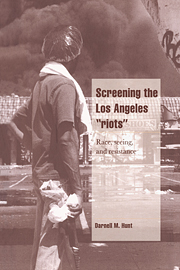Book contents
- Frontmatter
- Contents
- List of figures
- List of tables
- Preface
- 1 Introduction
- Part I Context and text
- Part II Audience
- Part III Analysis and Conclusions
- 7 Raced ways of seeing
- 8 Meaning-making and resistance
- Postscript
- Appendix A Data and methods
- Appendix B Figures
- Appendix C KTTV Transcript
- Appendix D Questionnaires
- Appendix E Tables
- Notes
- References
- Index
8 - Meaning-making and resistance
Published online by Cambridge University Press: 23 January 2010
- Frontmatter
- Contents
- List of figures
- List of tables
- Preface
- 1 Introduction
- Part I Context and text
- Part II Audience
- Part III Analysis and Conclusions
- 7 Raced ways of seeing
- 8 Meaning-making and resistance
- Postscript
- Appendix A Data and methods
- Appendix B Figures
- Appendix C KTTV Transcript
- Appendix D Questionnaires
- Appendix E Tables
- Notes
- References
- Index
Summary
If it is true that man cannot be conceived of except as historically determined man – i.e. man who has developed, and who lives, in certain conditions, in a particular social complex or totality of social relations – is it then possible to take sociology as meaning simply the study of these conditions and the laws which regulate their development? Since the will and initiative of men themselves cannot be left out of account, this notion must be false.
(Gramsci 1971, p. 244)In chapter 2, you will recall, I proposed that the television experience is a complex, iterative meaning-making process (see figure 2.3, appendix B). That is, I proposed that race-as- representation (1) sets parameters for television texts (2) and organizes intertextual memory (3); at the same time, I proposed that micro-level confrontations between television texts, intertextual memory, individual decodings (4), social network discussions (5), and negotiated decodings (6) shape the meanings viewers take away from any given encounter. Finally, I proposed that these macro- and micro-level processes necessarily feed into one another, mutually (re)shaping meaning with each iteration.
The findings that emerged from group discussions in this study seem to support the proposed model. First, race-as-representation clearly shaped the KTTV text's treatment of the events. KTTV news workers freely employed racial labels to identify event participants and victims as if “race” was somehow relevant to what was happening.
- Type
- Chapter
- Information
- Screening the Los Angeles 'Riots'Race, Seeing, and Resistance, pp. 145 - 165Publisher: Cambridge University PressPrint publication year: 1996



